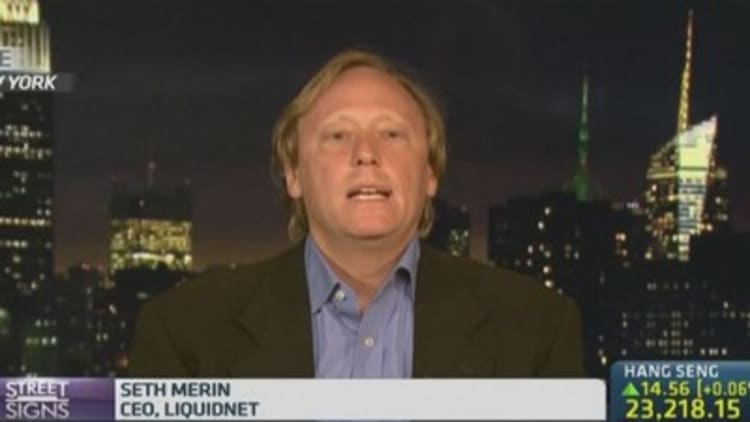Rep. Scott Garrett, chairman of the Financial Services Subcommittee on Capital Markets and Government-Sponsored Enterprises (which oversees the SEC), is holding a roundtable Monday in Washington on what, if anything, should be done about the way stocks are traded in this country.
I know, you've heard this before. In the wake of Michael Lewis' book "Flash Boys", there have been several hearings in Washington. This one is a little different, though. Here's why:
1) The 19 people attending are the cream of Wall Street's trading community. The heads of all the exchanges will be there, including many of the biggest market makers/brokers and key industry representatives. Everyone who knows anything about market structure will be part of the parade. You will probably never get all these people in the same room again.
2) The man putting on the event, Garrett, R-N.J., is well-regarded by the Street as a thoughtful lawmaker. What does he want to accomplish? He says his goal is to "produce more efficient markets, less investor confusion, better competition, and increased job creation."
Fair enough. Last year he held a similarly well-attended roundtable from academics; this time he wants the Wall Street community to weigh in. What he seeks is to forge a consensus on what, if anything, should be done. So what should we expect (or not expect)?

1) Do not expect a lot of hysterical screaming that "high frequency traders are taking over and ruining the market!" No screaming that "the markets are rigged!" Garrett is way too sophisticated for that (and he doesn't believe it). Instead, the emphasis will be on the market structure that the SEC has created and regulations that shape it.
2) Do expect him to eventually frame out a path for reform around three critical issues:
a) competition between market centers—the SEC wanted to encourage competition between the NYSE/NASDAQ and other market participants, but has the competition gone too far? Do we really need 11 exchanges and 45 dark pools? Do we need "fast" and "slow" data feeds? Do we need to have exchanges paying market participants to trade on their exchanges?
b) how do we make sure that the markets are technologically resilient? How to we do everything we can to reduce flash crashes, software upgrade glitches and breakdowns between exchanges?
c) how do we make the markets work better for capital generation and liquidity (initial public offerings, tick size pilots, etc.)?
These issues dovetail around the June 5 speech that Securities and Exchange Commission Chairwoman Mary Jo White gave at the Sandler O'Neill conference. She called for more transparency from dark pools, and wants high-frequency traders to register with the SEC as part of an effort to toughen market-making. She also wants more oversight of the algorithms used by these traders. She called for an "anti-disruptive trading" rule that might slow short-term trading by high frequency traders.
Notice the trend: Don't ban, but regulate more tightly. Require more disclosure.
That is likely what you will hear from Garrett. Remember, he is a congressman, but he's on the committee that oversees the SEC. The SEC will listen carefully to him, as part of Congress' dual authority to legislate or advise. Given the difficulty of passing any new legislation, you can expect, at the very least, a long, thoughtful letter from Garrett to White on what the SEC can do to improve market structure within its existing authority.
Where will this end? There will likely be: 1) a lot more regulation of high frequency traders and disclosure of dark pool activity; 2) activation of Reg SCI, which will create uniform rules for testing of technology, 2) a three-pronged pilot program to test trading small stocks in increments other than a penny.
One long-shot possibility on the table includes eliminating or reducing the fees that exchanges pay and collect to trade.
One person to watch is Fred Tomczyk, president and chief executive officer of TD Ameritrade. His firm has been under pressure because most retail firms get paid to provide their order flow to key market players.
A TD Ameritrade representative was grilled by Democratic Sen. Carl Levin during a June 17 hearing at the Senate Permanent Subcommittee on Investigations, where the representative admitted that all of TD Ameritrade's order flow was directed to the venues that paid them the highest fee—implying that the firm may have been less than diligent in making sure their customers got the best possible prices.Tomczyk will likely take the opportunity to set the record straight and play offense a bit.
In addition to Tomcyzk, these heavy hitters are listed as attendees:
Robert Greifeld, CEO, NASDAQ OMX;
Joe Ratterman, CEO, BATS Global Markets;
Jeffrey Sprecher, CEO, Intercontinental Exchange (ICE);
Bryan Durkin, CEO, CME Group;
Edward T. Tilly, CEO, Chicago Board Options Exchange;
Matt Andresen, co-CEO, Headlands Technologies;
Daniel B. Coleman, CEO, Knight Capital Group;
Adam Nunes, president, Hudson River Trading;
Jamil Nazarali, head of Citadel Executions Services, Citadel Securities;
Doug Cifu, CEO, Virtu Financial;
Jamie Selway, managing director and head of electronic brokerage and sales, ITG;
Joseph Gawronski, president and COO, Rosenblatt Securities;
Brett Redfearn, head of market structure strategy, Americas, JPMorgan Chase Securities;
Jim Toes, president and CEO, Security Traders Association;
Kenneth Bentsen Jr., CEO, Securities Industry and Financial Markets Association (SIFMA);
Bill Baxter, head of global program trading and market structure, Fidelity Management and Research, on behalf of the Investment Company Institute (ICI); and
Patrick Hickey, head of market structure, Optiver, on behalf of the FIA Principal Traders Group.
--By CNBC's Bob Pisani
CORRECTION: This version corrected the spelling of Tilly.


